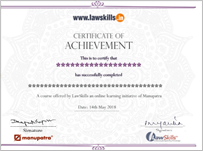Have general questions about LawSkills? You can find helpful information on LawSkills in our FAQ section.
Have a question about something specific? Contact LawSkills’ General Support Team directly for a quick and efficient response:
Please note: The LawSkills Support Team will address your queries in English. While we will do our best to address your enquiry in any language, our responses will be in English.
| Serial No. | Course Name | Text |
|---|---|---|
| 1 | General | Launch of LawSkills on 28th June 2017 |
Trademark is a Brand name. It can either be any name, symbol, logo, device and slogan which is primarily used to both identify and distinguish the goods or services of one person from that of the other. Eg. The logo of Mcdonald, Coca Cola, Nike etc. The purchasing decision of a person is highly influenced by the trademark and the reputation or goodwill associated to it. In this course, we will study the evolution of Trademarks, the development of the concept, Trademark as Asset etc.
Trademarks are of several kinds like Product marks, Service marks, Collective marks, Certification marks, etc. The purpose of a Trademark is the same irrespective of its kind. It allows the consumers to make a distinction between the sources of the product or the service and make an informed decision regarding their choice of purchase.
As per the Trademarks Act, 1999, it is not mandatory to get a mark registered in the course of its lifetime; however, it is advisable to get it registered as it provides certain advantages to the owner of the mark. The Registration process and the advantages associated with it have been thoroughly explained in detail in the course.
The concept of Genericide (Generic Mark), Abandonment of a mark and Infringement of a registered trademark, has been comprehensively discussed in the course. The relationship between Trademark and Advertisement has been made understood through a full-fledged module covered under the course.
Further, the Trademark protection prevailing at an International level through various Conventions and Treaties has been extensively outlined. The learner will be able to understand the use of a Trademark as a Collateral Security for Loans and Asset Management.
After completion learners will be able to:


Level: Beginner
Language: English
Duration: 6 Months
EVALUATION METHOD
Progress will be tested by way of quizzes and assignments at the end of each Module. Learners must attempt the exam at the end of the course and secure at least 50% marks to obtain course certificate.
Rajalakshmi V Nesargi is an attorney with more than 15 years of experience and holds LLM in Intellectual Property from Franklin Pierce Law Center (now University of New Hampshire), USA. Ms. Nesargi has extensive experience working with IT, neutraceutical and startup companies in the US and in India. She brings to the table, experience in strategic advising on IP asset creation, management and creating strategic alliance partnerships. She has extensive experience in drafting and negotiating IP related license agreements including joint development, material transfer agreements and technology transfer agreements and has experience in advising companies on IP prosecution and sponsored research and has authored articles on Copyright in Music Industry and actively participates in educating institutions and individuals about IP related protection and investment.
She has been assisted in authoring this course by Ms. Namrata Dubey a recent graduate from Institute of Law, Nirma University, Ahmedabad, has contributed with her research work.
Maryam Aseef Ibrahim is a third year law student of National University of Advanced Legal Studies, Kochi.
The Instructional Design of the course has been done by Team LawSkills.
Lawskills.in is now manupatracademy.com
For any queries write to us at academy@manupatra.com
This course page is for informational purposes only. We are **no longer accepting new registrations on this website.**
Please click the button below to be redirected to our new, official enrollment platform:
Go to New Registration Site| S.No. | Title | Date | File | Edit | Delete |
|---|


